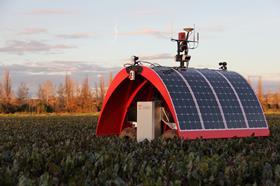
Brexit has the potential to fundamentally change firms’ business models if promises to end freedom of movement are delivered.
Some sectors of the fresh produce industry might consider the use of robots and greater automation, while others will require a carefully considered immigration policy to prevent damaging staff shortages.
This is according to a new Resolution Foundation report published on Monday ahead of a major conference on the future of robotics and its impact on the labour market.
Adam Corlett, Economic Analyst at the Resolution Foundation said: “People have long warned about the rise of the job stealing robots, but they haven’t had much effect to date in a country that has record employment and a terrible record on productivity.”
Brexit could change this, he believes. Although changes will take time, Corlett said companies need to start preparing now for a potential loss of migrant labour.
“For sectors like agriculture, further automation could provide part of the answer to coping with the changed labour market,” he said. “Although it will require a major shift in investment to become a reality.”
While it is still unclear what immigration controls will be introduced post-Brexit, further automation is most likely in sectors such as food manufacturing and agriculture – where at least one in eight workers are EU migrants – according to the report.
The study notes that most of these sectors also have a high proportion of low paid staff and already face a significant challenge, with the introduction of the National Living Wage set to affect two in five workers by 2020.
Drawing on research by economists Carl Frey and Michael Osborne, the Foundation recognises that while mechanisation will bring challenges in fast changing sectors, it may be needed given flat-lining productivity and the potential for significant changes in migration policy.
Different strategies will be open to different sectors in the fresh produce supply chain.
The need for further investment in technology is likely to prove most critical in food manufacturing, where almost a third of the workforce are EU migrants.
The Foundation notes that this has traditionally been a low-investment sector that may require new approaches if a significant tightening of migration policy takes place.
However, some migrant labour reliant sectors, such as domestic personnel work and transport support, have much less scope for automation.
Firms in these sectors willneed to think more broadly about how they respond and push for an accommodating immigration policy, the report suggests.
In any case, Brexit will force businesses “to make some pretty big calls on what investment and labour supply will look like in a post-Brexit economy,” said Corlett.